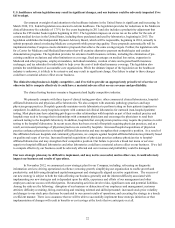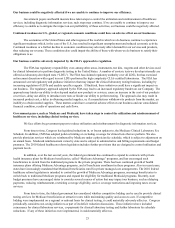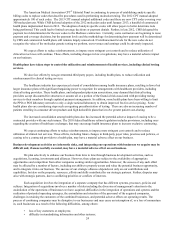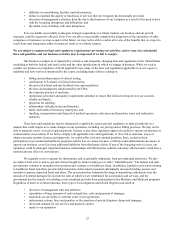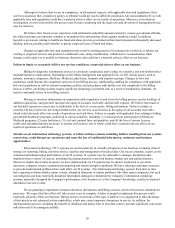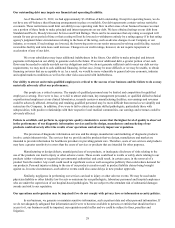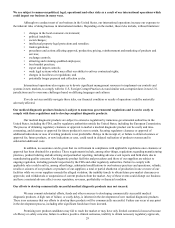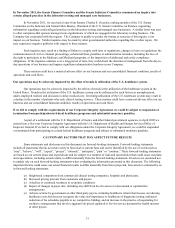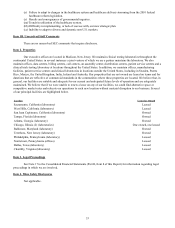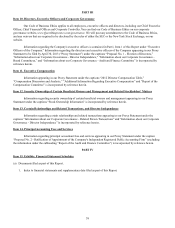Quest Diagnostics 2012 Annual Report Download - page 33
Download and view the complete annual report
Please find page 33 of the 2012 Quest Diagnostics annual report below. You can navigate through the pages in the report by either clicking on the pages listed below, or by using the keyword search tool below to find specific information within the annual report.30
failure to achieve market adoption, limited scope of approved uses, excessive costs to manufacture, the failure to establish or
maintain intellectual property rights, or the infringement of intellectual property rights of others. Even if we successfully
develop new products or enhancements or new generations of our existing products, they may be quickly rendered obsolete by
newer products, changing customer preferences or changing industry standards. Innovations may not be accepted quickly in the
marketplace because of, among other things, entrenched patterns of clinical practice or uncertainty over third party
reimbursement. We cannot state with certainty when or whether any of our medical diagnostic products under development will
be launched, whether we will be able to develop, license or otherwise acquire products, or whether any diagnostic products will
be commercially successful. Failure to launch successful new products or new indications for existing products may cause our
products to become obsolete.
Our operations may be adversely impacted by the effects of natural disasters such as hurricanes and earthquakes,
health pandemics, hostilities or acts of terrorism and other criminal activities.
Our operations may be adversely impacted by the effects of natural disasters such as hurricanes and earthquakes,
health pandemics, hostilities or acts of terrorism or other criminal activities. Such events may result in a temporary decline in
the number of patients who seek clinical testing services or in our employees' ability to perform their job duties. In addition,
such events may temporarily interrupt our ability to transport specimens, to receive materials from our suppliers or otherwise to
provide our services.
Our business could be adversely impacted by CMS' adoption of the new coding set for diagnoses.
CMS has adopted a new coding set for diagnosis, commonly known as ICD-10, which significantly expands the
coding set for diagnoses. The new coding set is currently required to be implemented by October 1, 2014. We may be required
to incur significant expense in implementing the new coding set, and if we do not adequately implement it, our business could
be adversely impacted. In addition, if as a result of the new coding set physicians fail to provide appropriate codes for desired
tests, we may not be reimbursed for such tests.
Our business could be adversely impacted by adoption of new coding for molecular genetic tests.
The American Medical Association CPT® Editorial Panel is continuing its process of establishing analyte specific
billing codes to replace codes that describe procedures used in performing molecular testing. The 2012 CPT manual adopted
approximately 100 of such codes. The 2013 CPT manual adopted additional codes and there are now CPT codes covering over
300 molecular tests. While CMS deferred adoption of the 2012 molecular codes until January 2013, a handful of commercial
health plans implemented them in 2012. The adoption of analyte specific codes will allow payers to better determine tests
being performed. This could lead to limited coverage decisions or payment denials. Further, in late 2012, CMS delegated the
payment level determination for the new codes to the Medicare contractors. Currently, some contractors are beginning to issue
payment and coverage decisions, but the payment levels and the methodology for determining how payment will be determined
by CMS and commercial health plans still remains largely unresolved. If reimbursement levels for the new codes do not
recognize the value of the molecular genetic testing we perform, our revenues and earnings could be adversely impacted.
Adverse results in material litigation could have an adverse financial impact and an adverse impact on our client base
and reputation.
We are involved in various legal proceedings arising in the ordinary course of business including, among other things,
disputes as to intellectual property, professional liability and employee-related matters, as well as inquiries from governmental
agencies and Medicare or Medicaid carriers. Some of the proceedings against us involve claims that are substantial in amount
and could divert management's attention from operations. The proceedings also may result in substantial monetary damages, as
well as damage to our reputation, and decrease the demand for our services and products, all of which could have a material
adverse effect on our business. We do not have insurance or are substantially self-insured for a significant portion of any
liabilities with respect to some of these claims. The ultimate outcome of the various proceedings or claims could have a
material adverse effect on our financial condition, results of operations or cash flows in the period in which the impact of such
matters is determined or paid.




